Economics > EXAM > GENTECH 3EE3 Quiz Chapter 1 – McMaster University | Chapter 1 Engineering Decision Making (All)
GENTECH 3EE3 Quiz Chapter 1 – McMaster University | Chapter 1 Engineering Decision Making
Document Content and Description Below
GENTECH 3EE3 Quiz Chapter 1 – McMaster University Engineering Economics, 5e (Fraser) Chapter 1 Engineering Decision Making 1.1 Multiple Choice Questions 1) Evaluation of an engineeri... ng project involves the following constraints: A) financial, environmental, social and political constraints. B) technical and financial constraints. C) technological and social constraints. D) time and money constraints. E) budget and time constraints. Diff: 1 Type: MC Page Ref: 3 Topic: 1.1. Engineering decision making Skill: Recall User1: Qualitative 2) Engineering economics is A) a body of knowledge to determine which of several alternative is technically best. B) a collection of techniques for quantitative analysis to select a preferable alternative from several technically viable ones. C) a set of tools to calculate an engineering project's costs. D) a set of rules to evaluate an engineering project. E) a set of methods to determine an engineering project's costs in terms of time value of money. Diff: 1 Type: MC Page Ref: 3 Topic: 1.2. What is engineering economics Skill: Recall User1: Qualitative 3) From an economic standpoint, any engineering project can be thought of in terms of A) its costs and benefits over time. B) its constraints. C) its receipts and disbursements. D) its revenues and profits over time. E) its investment and costs over time. Diff: 1 Type: MC Page Ref: 3 Topic: 1.2. What is engineering economics Skill: Recall User1: Qualitative 4) In the context of your textbook, abstraction means A) a study. B) a method C) a methodology D) a model. E) an approach Diff: 1 Type: MC Page Ref: 6 Topic: 1.4. Dealing with abstractions Skill: Recall User1: Qualitative 5) When an engineer prepares a feasibility study, what economic information must she possess in order to do it correctly? A) engineering specification B) expert opinion about this project C) macroeconomic situation in the world D) potential future costs and benefits of the project E) the level of uncertainty Diff: 2 Type: MC Page Ref: 6 Topic: 1.4. Dealing with abstractions Skill: Applied User1: Qualitative 6) In which of the following problems do you need engineering economics? A) to choose a course in your program B) to chose the right textbook C) to decide whether to borrow money from parents or from a bank D) to decide whether or not to buy a car E) to decide where to spend summer vacation Diff: 2 Type: MC Page Ref: 6-8 Topic: 1.4. Dealing with abstractions Skill: Applied User1: Qualitative 7) Which of the following statements best describes the moral issues faced by engineers while evaluating projects? A) moral issues are clearly defined in engineering design B) moral issues do not matter as long as technical goals are achieved C) your employer is the only person who can define what is ethical or unethical D) there are no general answers to moral questions E) since moral issues are value judgements they must not be taken into consideration Diff: 3 Type: MC Page Ref: 9-10 Topic: 1.5. The moral question: Three true stories Skill: Applied User1: Qualitative 8) The best way to find some answers to difficult moral questions in engineering design and project evaluation is A) to ask your friends. B) to consult professional engineering associations. C) to search the web. D) to read newspapers. E) to read professional textbooks. Diff: 2 Type: MC Page Ref: 9-10 Topic: 1.5. The moral question: Three true stories Skill: Recall User1: Qualitative 9) Stan borrowed $5 000 one year ago. Now he has to repay $5 100. The interest Stan pays is A) $5 100 B) 102% C) $100 D) 2% E) $5 000 Diff: 2 Type: MC Page Ref: 6-8 Topic: 1.4. Dealing with abstractions Skill: Applied User1: Quantitative 10) Joan borrowed $1 000 one year ago. Now she has to repay $1 100. Therefore, the interest rate she pays is A) $1 000 B) $1 100 C) $100 D) 110% E) 10% Answer: E Diff: 2 Type: MC Page Ref: 6-8 Topic: 1.4. Dealing with abstractions Skill: Applied User1: Quantitative 11) All but one of the following are economic criteria to evaluate an engineering project. Which one is the non-economic criterion? A) maximum profit B) minimum cost C) minimum pollution D) maximum rate of return E) minimum payback period Diff: 2 Type: MC Page Ref: 2-6 Topic: 1.2. What is engineering economics Skill: Applied User1: Qualitative 12) Analyze the following statement: "There is 50% probability of raining". This statement concerns A) extrapolation. B) risk. C) precise description. D) abstraction. E) expected scenario. Diff: 2 Type: MC Page Ref: 11 Topic: 1.6. Uncertainty, sensitivity analysis, and currencies Skill: Applied User1: Qualitative 13) To resolve uncertainty, engineers apply A) marginal analysis. B) cash-flow analysis. C) sensitivity analysis. D) risk analysis. E) economic impact analysis. Diff: 2 Type: MC Page Ref: 11 Topic: 1.6. Uncertainty, sensitivity analysis, and currencies Skill: Recall User1: Qualitative 14) If you are asked to choose between $100 today and $150 one year from now, you are being asked to A) make a guess. B) reveal your implied interest rate. C) compare two values which are not comparable in principle. D) reveal your private financial information. E) make a choice under uncertainty. Diff: 3 Type: MC Page Ref: 6-8 Topic: 1.4. Dealing with abstractions Skill: Applied User1: Qualitative 15) Which of the following items has negligible maintenance costs? A) computer B) building C) ruler D) shoes E) fur hat Diff: 2 Type: MC Page Ref: 6-8 Topic: 1.4. Dealing with abstractions Skill: Applied User1: Qualitative 16) You decide to buy a car. The following are some questions you have to answer with respect to your purchase. Which question is directly associated with engineering economics? A) what colour? B) what size? C) CD player or tape player? D) to lease or to own? E) Ford or Toyota? Diff: 2 Type: MC Page Ref: 3 Topic: 1.3. Making decisions Skill: Applied User1: Qualitative 17) Susan is evaluating an engineering project. She assumes zero inflation for the duration of the project. With respect to this situation, which statement is consistent with the subject matter of engineering economics? A) A zero inflation assumption is always a good one. B) A zero inflation assumption is not realistic but it is better than assuming some uncertain inflation rate. C) A zero assumption is not a bad one for the base case, but then the project should be evaluated under different values in some range to see how inflation affects the project. D) Since in Canada inflation is low, it is possible to neglect it. E) The highest historical inflation rate must be chosen instead. Diff: 3 Type: MC Page Ref: 3-6 Topic: 1.4. Dealing with abstractions Skill: Applied User1: Qualitative 18) An owner of a small company is deciding to sell her business. She received several options specified bellow. Which one should the company's owner accept? A) $600 000 in cash B) $500 000 in government bonds earning a 5% rate of return over 10 years C) $400 000 in securities earning an 8% rate of return over 8 years D) 15% of the future profits earned by the next owner during first 10 years E) it is impossible to compare these offers due to uncertainty about basic economic variables over time Answer: E Diff: 3 Type: MC Page Ref: 3-6 Topic: 1.4. Dealing with abstractions Skill: Applied User1: Quantitative 19) Suppose that you are asked to evaluate a project of building a new bridge. Which of the following factors is the least important in terms of engineering economics? A) service life of the bridge B) value added by the bridge C) cost structure D) vehicle stock in your city E) current interest rate Diff: 3 Type: MC Page Ref: 3-6 Topic: 1.4. Dealing with abstractions Skill: Applied User1: Qualitative 20) Based on your intuition and experience, which of the following options has the highest value? A) $100 government bond earning a 5% annual rate of return B) $100 invested in a fund with a 10% annual rate of return C) $200 government bond earning a 5% annual rate of return D) $200 invested in a fund earning a 10% annual rate of return E) $150 invested in a fund earning a 7% annual rate of return Diff: 2 Type: MC Page Ref: 6-8 Topic: 1.4. Dealing with abstractions Skill: Applied User1: Quantitative 21) Engineering economics is important because A) it is a natural science. B) it provides answers to all financial questions. C) it facilitates the establishment of verifiable facts about decisions. D) it uses mathematical models to address engineering issues. E) it is based on objective laws. Diff: 2 Type: MC Page Ref: 4 Topic: 1.2. What is engineering economics Skill: Recall User1: Qualitative 22) What is the best way to describe a mathematical model? A) It is an exact copy of the real world. B) It is a simplification to describe the real world in a reasonable way. C) It is a set of mathematical relationships with assumptions based on natural laws. D) It is a relationship that includes all aspects of a modelling situation. E) It describes all complex processes that occur in the real world. Diff: 2 Type: MC Page Ref: 6 Topic: 1.4. Dealing with abstractions Skill: Recall User1: Qualitative 23) In engineering economics, sensitivity analysis A) addresses risk in engineering projects. B) addresses inflation in a country. C) involves random variables with their probabilities. D) assesses the effect of uncertainty on a decision. E) involves cash flows that are known with certainty. Diff: 3 Type: MC Page Ref: 11-12 Topic: 1.6. Uncertainty, sensitivity analysis, and currencies Skill: Recall User1: Qualitative 24) Most of the economic values we use in our evaluation of engineering projects are A) precise and very descriptive. B) approximate. C) based on robust statistical estimation. D) derived from natural experiments. E) results of precise statistical surveys. Diff: 2 Type: MC Page Ref: 11 Topic: 1.6. Uncertainty, sensitivity analysis, and currencies Skill: Recall User1: Qualitative 25) When we say "let us assume that economic agents are rational", in fact we A) precisely describe behaviour of economic agents. B) want economic agents to behave that way. C) make an assumption to predict the agents' behaviour. D) impose restrictions on our model. E) introduce uncertainty into our modelling process. Diff: 3 Type: MC Page Ref: 6 Topic: 1.3. Making decisions Skill: Applied User1: Qualitative 1.2 Short Answer Questions 1) What is the subject matter of Engineering Economics? Answer: Engineering economics deals with techniques of quantitative analysis useful for selecting a preferable alternative from several technically viable ones. Its major objective is to allow an engineer to determine which of several alternatives is economically best. Diff: 1 Type: SA Page Ref: 3 Topic: 1.2. What is engineering economics Skill: Recall User1: Qualitative 2) Briefly describe the structure of a decision-making process as discussed in your textbook. Answer: The textbook presents this structure in a form of a pyramid. At the top of the pyramid are preferences, which directly control the choices made. The next tier is composed of people and politics. Politics means the use of power in organizations. The next tier is a collection of facts. The facts, which may not be verifiable, contribute to the politics and people, and indirectly to the preferences. At the bottom of the pyramid are the activities that contribute to the facts. These include the history of previous similar decisions, statistics of various sorts, and a determination of costs. Diff: 2 Type: SA Page Ref: 4-5 Topic: 1.3. Making decisions Skill: Recall User1: Qualitative 3) Explain the role of a mathematical model in engineering economics. Answer: When one describes something, one does so for a purpose. In the description, one selects aspects of the real world that are relevant to that purpose. The process of simplifying the complexities of the real world is necessary for any engineering analysis. This process of simplification is called abstraction or a model. Once a model is developed, it is used to analyze a situation, and perhaps make some predictions about the real world. The analysis and the predictions are then related back to the real world to make sure that the model is valid. The role of abstractions is to develop a viable mode of the real world. Diff: 2 Type: SA Page Ref: 6 Topic: 1.4. Dealing with abstractions Skill: Recall User1: Qualitative 4) How should engineers address moral questions associated with economic evaluation of engineering projects? Answer: Engineers have a responsibility to society to behave ethically and responsibly in all ways. When many different issues must be taken into account in engineering decision making, it is often difficult to determine what course of action is ethical. There are no general answers to difficult moral questions. Practicing engineers often have to make choices with an ethical component, and can sometimes rely on no stronger foundation than their own sense of right and wrong. More information about ethical issues for engineers can be obtained from provincial professional engineering organizations. Diff: 1 Type: SA Page Ref: 8-10 Topic: 1.5. The moral question: Three true stories Skill: Recall User1: Qualitative 5) Suppose that you are about to start a new business: You will provide consulting services for those who want to launch their own web-sites. What major decisions based on the subject matter of engineering economics should be made before you set up your business activities? Answer: You have to evaluate the expected future costs and benefits of your enterprise. In doing so, you have to understand your final product and identify a market for that product. As a result, you will be able to evaluate your expected revenues. This is known as demand-side analysis. On the supply side, you have to understand all materials, efforts and services involved in producing and/or providing your product. This will give you a cost structure. Then you have to define your planning horizon in order to use economic forecasts of major macroeconomic variables such as interest rate, inflation and others. You have to understand the Canadian tax system as well. If you are uncertain about values of some variables involved, you have to use principles of sensitivity analysis. All this is the subject matter of engineering economics. Diff: 3 Type: SA Page Ref: 3-5, 11 Topic: 1.4. Dealing with abstractions Skill: Applied User1: Qualitative 6) As a University student, when you look for a new apartment, what economic criteria consistent with the subject matter of engineering economics do you apply? Answer: You have to understand your budget in terms of cash inflows and outflows. Cash inflows may include: a fellowship, a grant, a loan, an allowance provided by parents and others. Cash outflows to consider are: costs of utilities, transportation cost, cost of textbooks, tuition fee, food expenses, and others. As well, time should be explicitly introduced into your economic analysis. Therefore, for example, a more expensive apartment closer to the University can be preferred to a cheaper one far away, based on transportation costs. Diff: 2 Type: SA Page Ref: 3-5 Topic: 1.3. Making decisions Skill: Applied User1: Qualitative 7) Suppose that in order to finance your studies at the University, three options are available to you: (i) a student loan, (ii) a student line of credit, and (iii) a part-time job at minimum wage. In making your decision, what factors should be taken into account and why? oth a student loan and a student line of credit represent borrowing. There are costs associated with borrowing and it is necessary to compare them. In general, a student loan is interest-free as long as you stay in school, while a student line of credit is not interest-free. It means that the costs of borrowing associated with a student loan are lower. Of course, earning your own money is a good option since you avoid paying costs of borrowing. On the other hand, if you work you forgo opportunity to spend this time on your studies. There are some costs associated with that opportunity, called opportunity costs. If the opportunity costs of working exceed the costs of borrowing under student loan, then the latter is the best option. Otherwise, working is a better option. Diff: 3 Type: SA Page Ref: 3-7 Topic: 1.3. Making decisions Skill: Applied User1: Qualitative 8) List at least three non-economic factors (attributes) that may be used as evaluation criteria in the decision-making process. Answer: Non-economic factors are mainly associated with social, environmental and political constraints. Examples are: - Results of new elections; - Introduction of a new welfare program; - Introduction of new environmental standards. Diff: 1 Type: SA Page Ref: 4-6 Topic: 1.3. Making decisions Skill: Applied User1: Qualitative 9) When evaluating an engineering project, what types of constraints does a decision maker face? project might be technically feasible and the cheapest solution to a problem, but if it doesn't earn money at the minimum rate required by the company, it should not be done. The decision maker therefore has to be aware of the financial constraints on the problem. In addition, an engineering project can meet all other criteria, but may cause detrimental environmental effects, so we must also consider environmental constraints. Finally, any project can be affected by social and political constraints. Diff: 2 Type: SA Page Ref: 3-6 Topic: 1.3. Making decisions Skill: Recall User1: Qualitative 10) Every year Stan takes a Canada student loan of $5 000 to pay his tuition fees at the University. The loan is interest-free for as long as Stan is a full-time student. After graduation, he will have to start re-paying the loan within 6 months including interest. Is this a good decision? Why? Answer: Yes, this is a good decision. Stan can borrow $20 000 for four years or $25 000 for five years for free. If this money were invested in a mutual fund or in financial securities, it would earn some return. Or if Stan borrowed the money from a commercial bank, he would pay interest payments to service his debt. Student loan has no borrowing costs. Diff: 2 Type: SA Page Ref: 3-6 Topic: 1.3. Making decisions Skill: Applied User1: Quantitative 11) If you decide to buy a home, list basic economic and non-economic factors you have to take into account and rank them Answer: You need to know the price of a home, current mortgage rate,potential duration of the mortgage and your own current and expected income. Those are fundamental economic factors. Non-economic factors may include: location, environmental quality, and safety. Diff: 2 Type: SA Page Ref: 3-6, 11 Topic: 1.6. Uncertainty, sensitivity analysis, and currencies Skill: Applied User1: Qualitative 12) Suppose that a local government decides to build a bridge. In order to justify this project, economists want to ask people directly about their willingness to pay for the bridge. Using the discussion in your textbook, list at least three problems with this economic measure. Answer: The following three problems can be mentioned in this regard: (i) willingness to pay for a non-market good is very difficult to define; (ii) willingness to pay for non-market good is very subjective measure; (ii) it will require a lot of data and comprehensive statistical analysis to evaluate total willingness to pay for the bridge Diff: 3 Type: SA Page Ref: 6-7 Topic: 1.4. Dealing with abstractions Skill: Applied User1: Qualitative 13) You were notified by an economics expert that the total costs of a project you are about to start are approximately $50 000. In order to justify this project, what additional economic information do you need? Answer: First of all, it is necessary to understand what this value includes. Usually costs are divided into capital costs and operating costs and those are two different types of costs. Second, it is necessary to understand whether or not the value of total costs is given as of today or at some other time. Finally, the benefits of the project should be evaluated to compare them with total costs. Diff: 1 Type: SA Page Ref: 3-4 Topic: 1.3. Making decisions Skill: Recall User1: Qualitative 14) Maintenance costs are an important component of the total costs of many engineering projects. Normally in engineering projects these costs are added to the purchase price of a piece of engineering equipment. For the following items, describe how important the maintenance costs are compared to the item's price: (i) A tractor (ii) A desk (iii) A computer (iv) An oil pump Answer: The maintenance costs of a tractor, computer and oil pump are important. Particularly maintenance costs of a tractor are very important since the quantity and quality of the services, produced by the tractor, depend on these costs. To lesser extent maintenance costs are important in case of oil pump and computer. Maintenance costs of a desk are not important because they are very low, and have little effect on the services provided by the desk. Diff: 1 Type: SA Page Ref: 3-6 Topic: 1.3. Making decisions Skill: Applied User1: Qualitative 15) Suppose that you want to buy a used car for $3 000, but you don't have enough cash. List some of the (legal) strategies that you might consider. Answer: Possible alternatives for financing the purchase of a used car are: - Not to buy (a "do nothing" alternative); - To borrow money from your parents; - To take a loan from a commercial bank; - To finance through a car dealer; - To postpone the purchase and earn money working extra hours. Diff: 2 Type: SA Page Ref: 3-6 Topic: 1.3. Making decisions Skill: Applied User1: Qualitative [Show More]
Last updated: 1 year ago
Preview 1 out of 23 pages
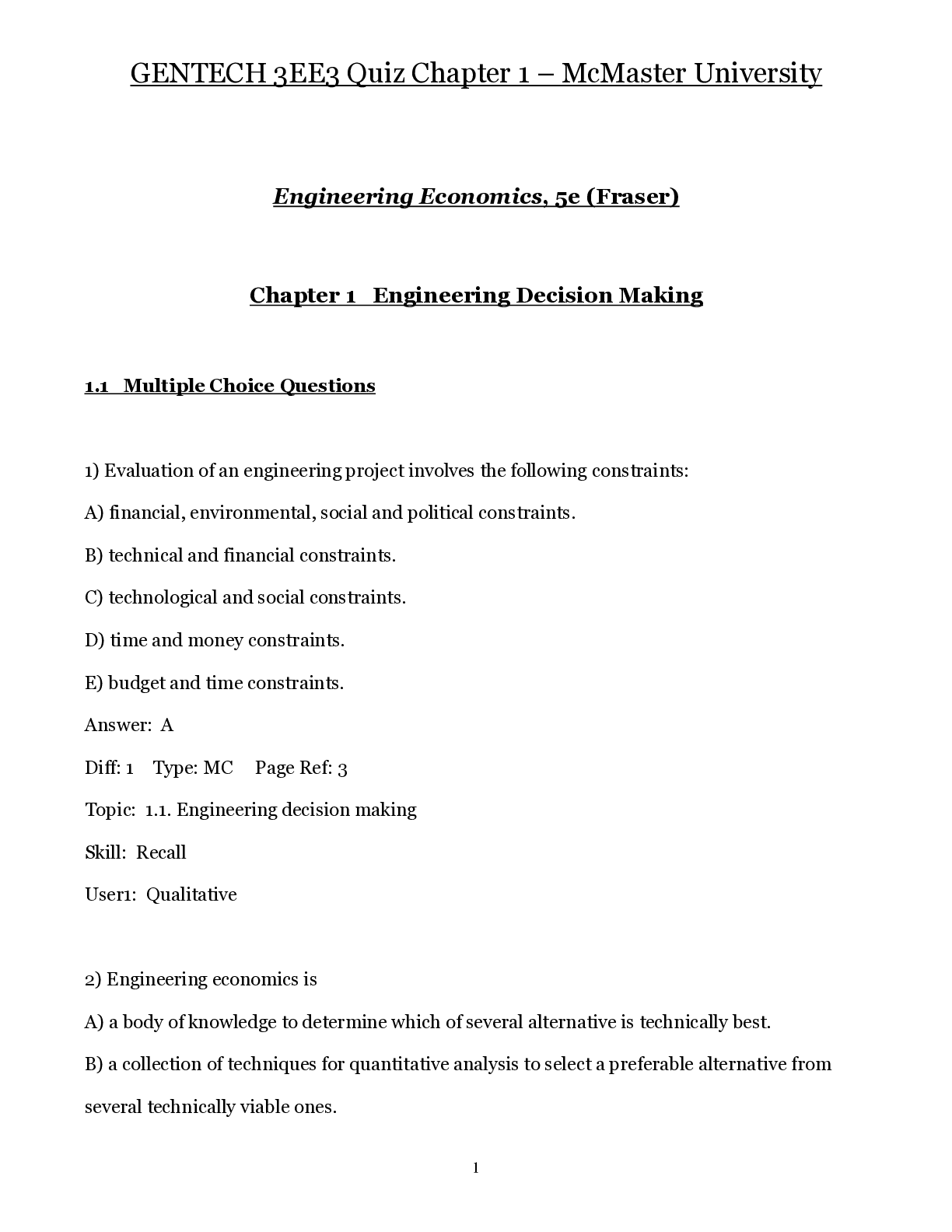
Reviews( 0 )
Recommended For You
*NURSING> EXAM > Test Bank Medical-Surgical Nursing Concepts for Interprofessional Collaborative Care 10th Edition by Donna D. Ignatavicius |Test Bank| Chapter 1-69 (All)
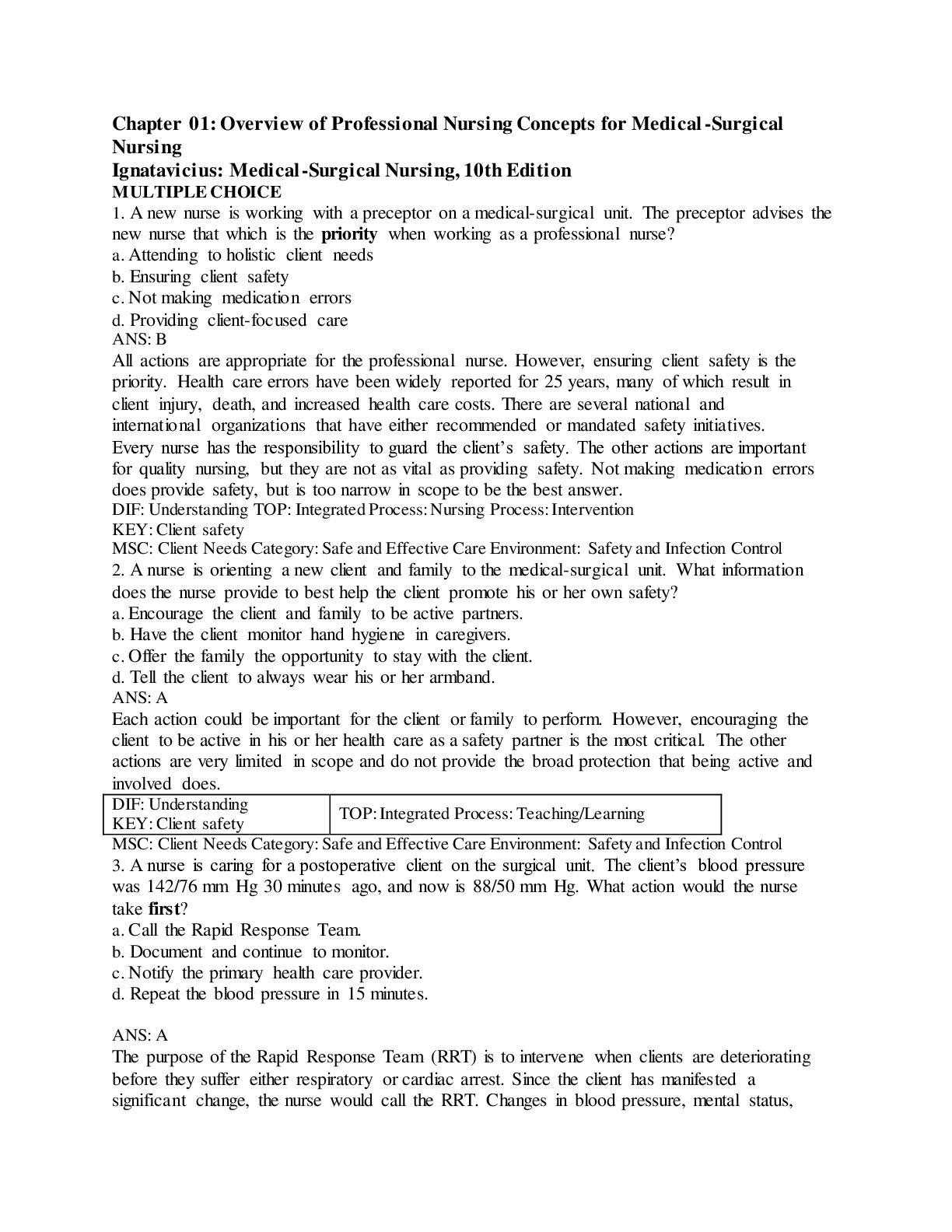
Test Bank Medical-Surgical Nursing Concepts for Interprofessional Collaborative Care 10th Edition by Donna D. Ignatavicius |Test Bank| Chapter 1-69
Test Bank Medical-Surgical Nursing Concepts for Interprofessional Collaborative Care 10th Edition by Donna D. Ignatavicius |Test Bank| Chapter 1-69
By Tutorsammy , Uploaded: May 27, 2022
$10
Food and Nutrition> EXAM > MCTSCA | Servsafe Manager (7th edition) | Chapter 1 Questions with COMPLETE SOLUTION (All)
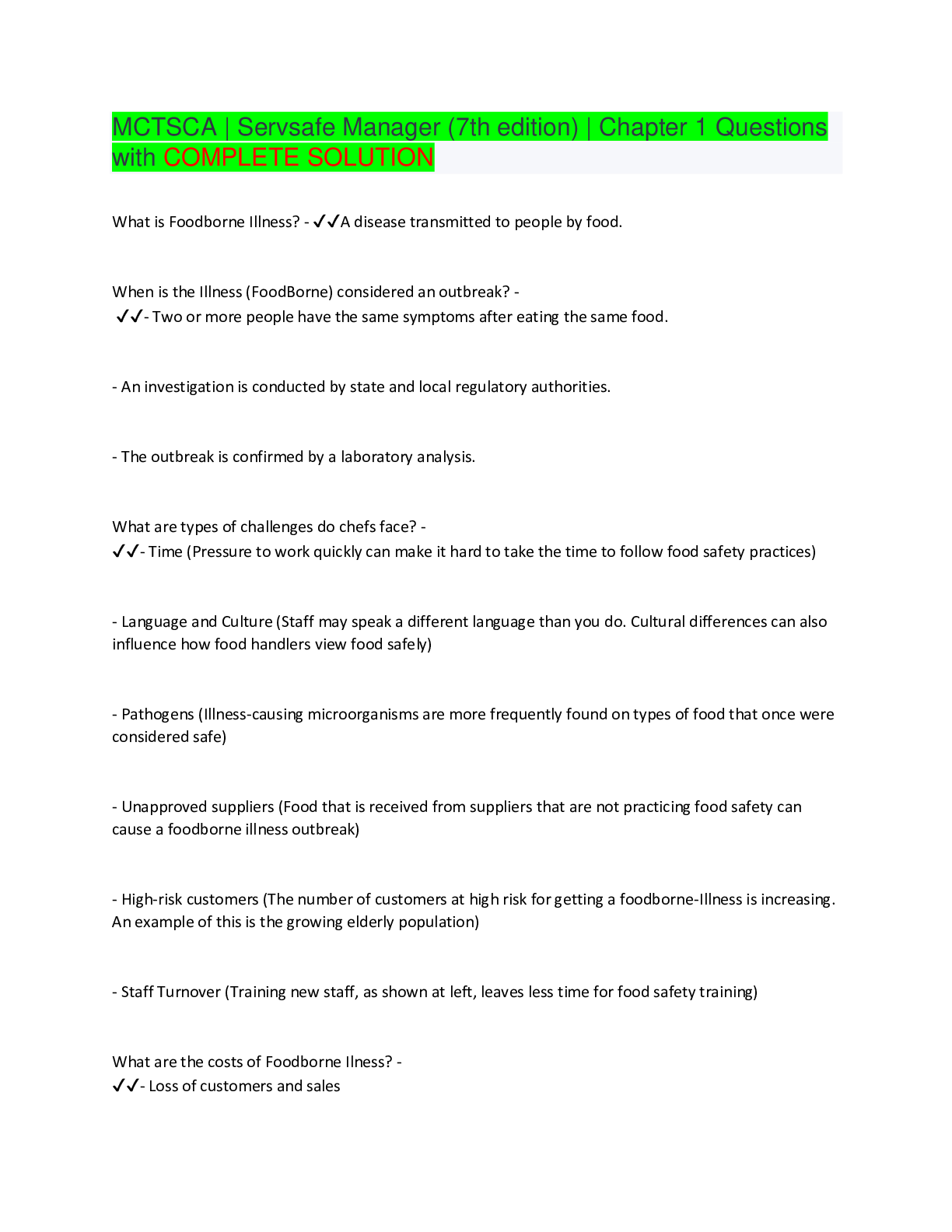
MCTSCA | Servsafe Manager (7th edition) | Chapter 1 Questions with COMPLETE SOLUTION
What is Foodborne Illness? - ✔✔A disease transmitted to people by food. When is the Illness (FoodBorne) considered an outbreak? - ✔✔- Two or more people have the same symptoms after eating the same...
By Tessa , Uploaded: May 26, 2022
$7
Education> EXAM > LAW001 Quiz Chapter 13 capacity/LAW001 Quiz Chapter 13 capacity (All)
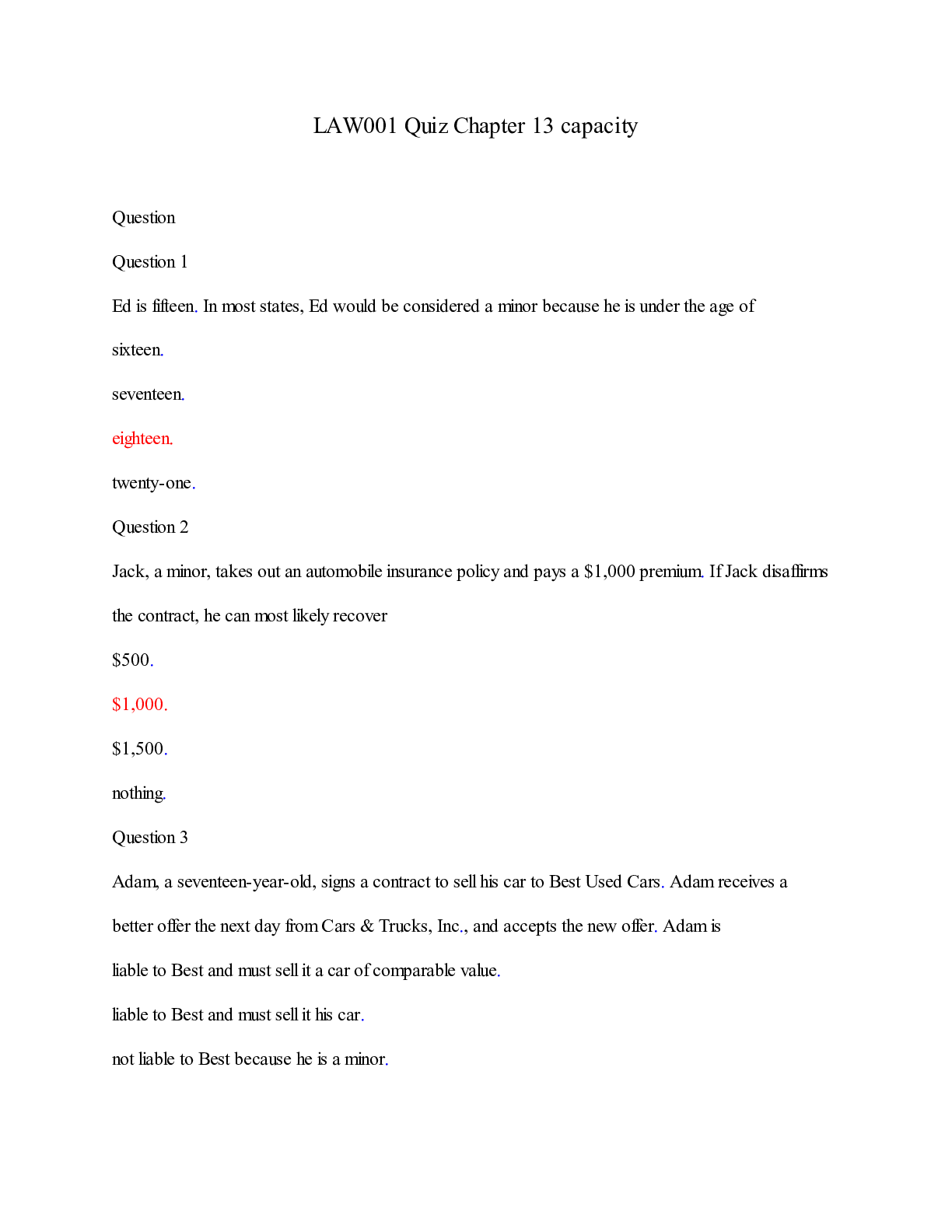
LAW001 Quiz Chapter 13 capacity/LAW001 Quiz Chapter 13 capacity
Question Question 1 Ed is fifteen. In most states, Ed would be considered a minor because he is under the age of sixteen. seventeen. eighteen. twenty-one. Question 2 Jack, a minor, takes out a...
By alan2028 , Uploaded: Apr 25, 2022
$15
Economics> EXAM > Middle Tennessee State University MBAE 6865 Economic Decisions for Managers. Quiz CHAPTER 16. All Answers Correct. (All)
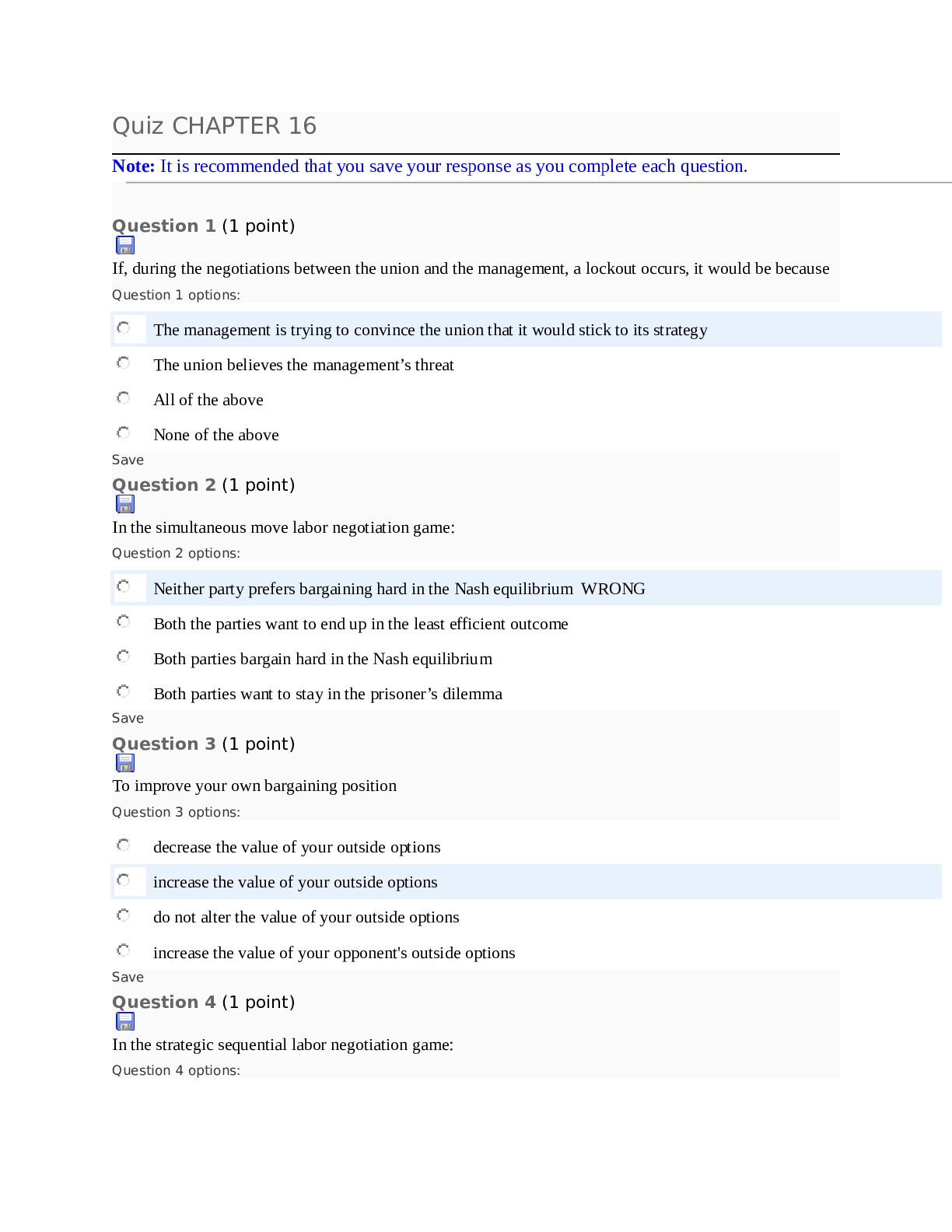
Middle Tennessee State University MBAE 6865 Economic Decisions for Managers. Quiz CHAPTER 16. All Answers Correct.
Quiz CHAPTER 16 Note: It is recommended that you save your response as you complete each question. Question 1 (1 point) If, during the negotiations between the union and the management, a lockout o...
By SuperSolutions© , Uploaded: Apr 15, 2022
$12
Communication> EXAM > COMS 101 Quiz chapter 10 Liberty University Complete Answers 2021 (All)
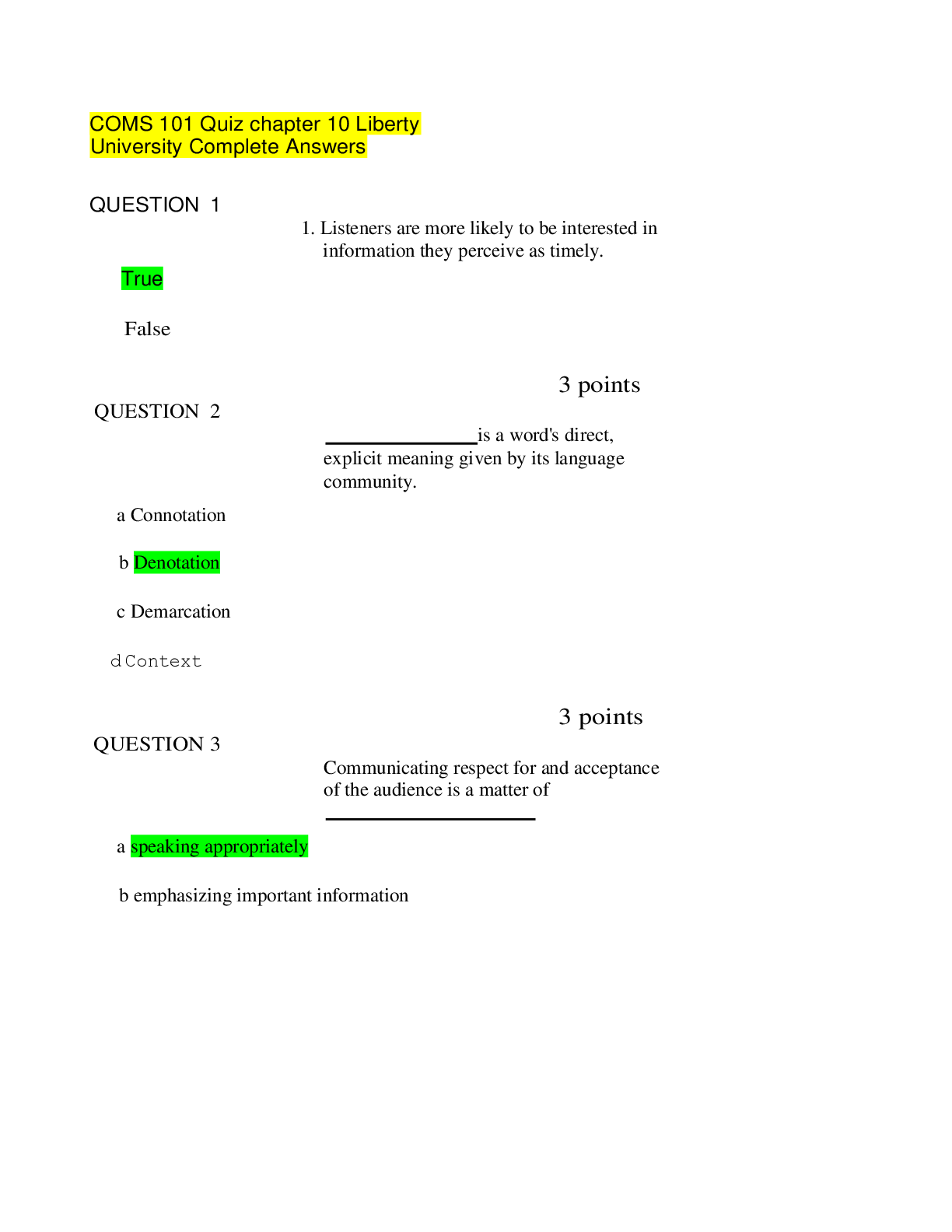
COMS 101 Quiz chapter 10 Liberty University Complete Answers 2021
COMS 101 Quiz chapter 10 Liberty University Complete Answers QUESTION 1 True False QUESTION 2 a Connotation b Denotation c Demarcation d Context QUESTION 3 1. Li steners are more likely to be interest...
By GradeProfessor , Uploaded: Jun 16, 2021
$6
English> EXAM > COMS 101 Com Quiz Chapter 13:14,100% CORRECT (All)
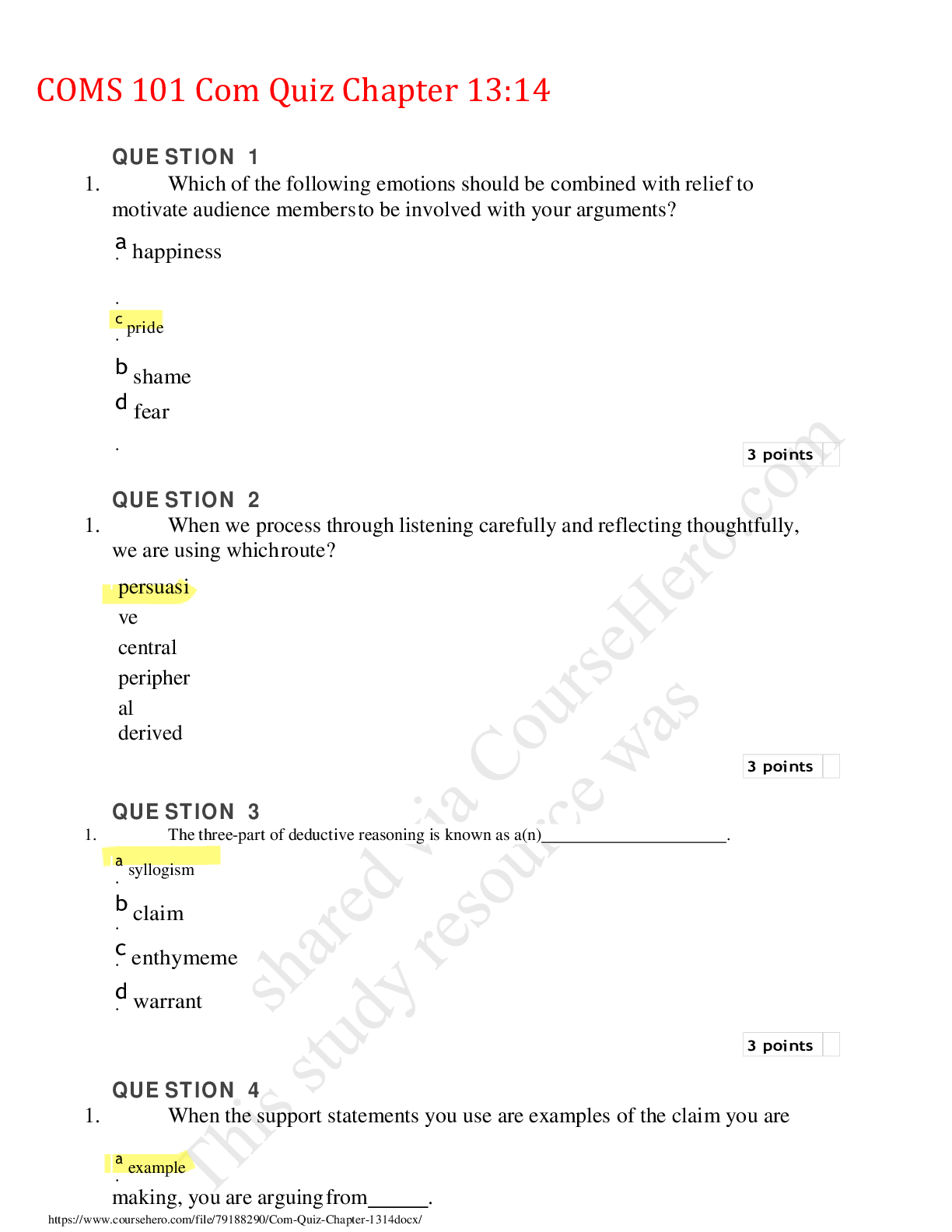
COMS 101 Com Quiz Chapter 13:14,100% CORRECT
QUE STION 1 1. Which of the following emotions should be combined with relief to motivate audience members to be involved with your arguments? a happiness b shame d fear QUE STION 2 1. When...
By securegrades , Uploaded: Jun 11, 2021
$8
Education> EXAM > APU PSYC300 Week 7 Quiz Chapter 12 and 13 (All)
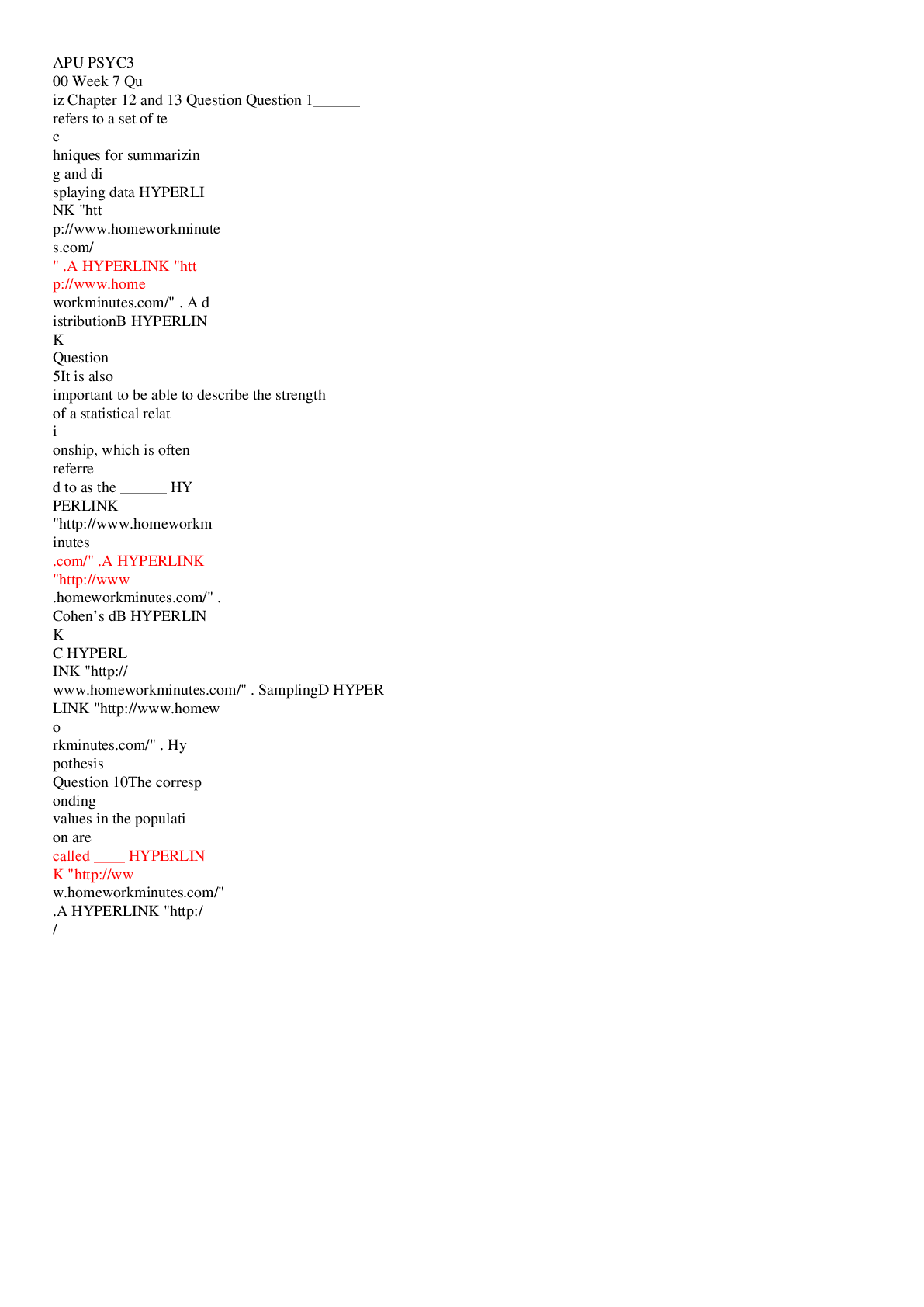
APU PSYC300 Week 7 Quiz Chapter 12 and 13
Question Question 1 ______ refers to a set of techniques for summarizing and displaying data. A. A distribution B. A histogram C. An outlier D. Descriptive statistics Question 2 An alternativ...
By alan2028 , Uploaded: Apr 14, 2021
$6
Pharmacology> EXAM > TEST BANK Pharmacology and the Nursing Process 9th Edition Linda Lane Lilley, Shelly Rainforth Collins, Julie S. Snyder | Chapter 1-58 complete questions, answers, rationales > A+ Guide (All)
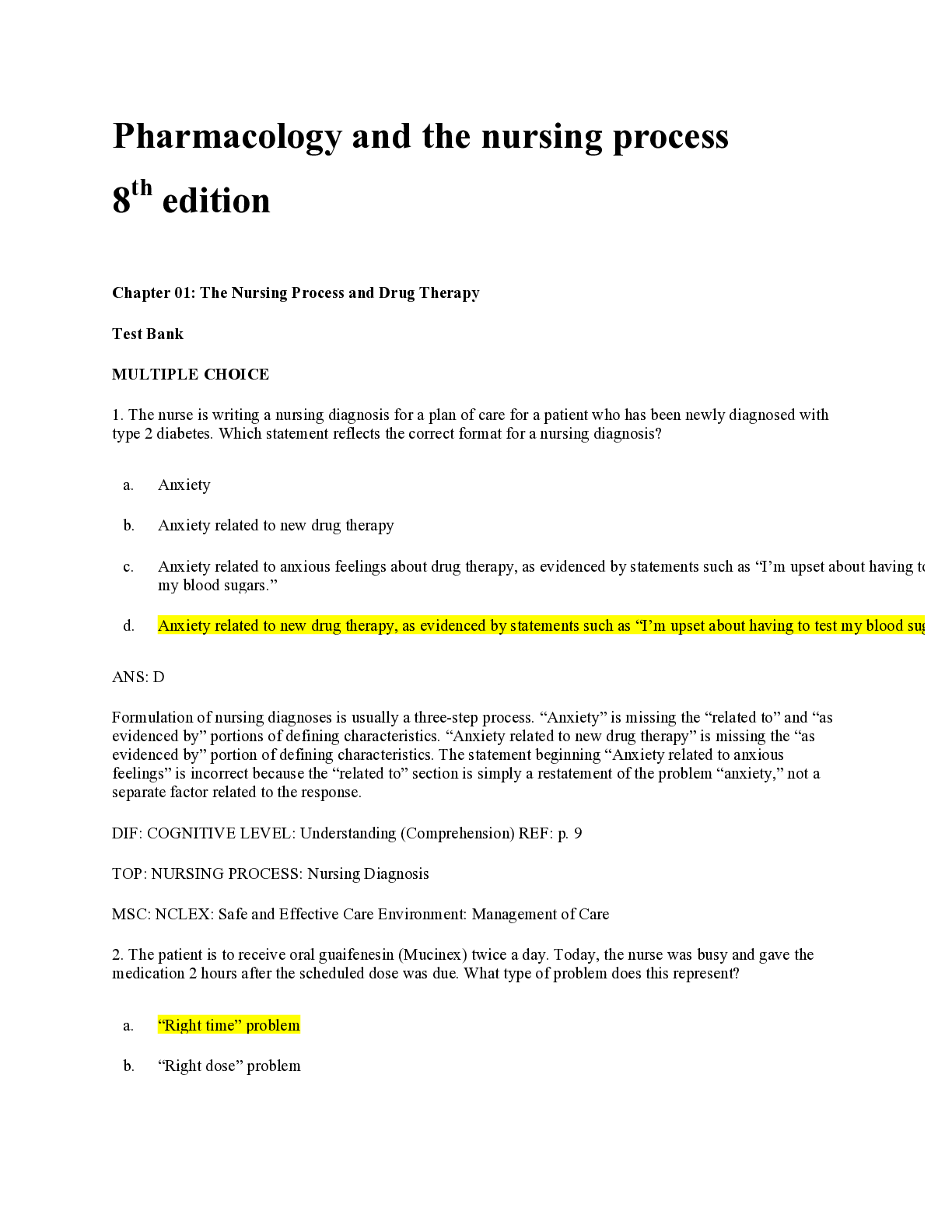
TEST BANK Pharmacology and the Nursing Process 9th Edition Linda Lane Lilley, Shelly Rainforth Collins, Julie S. Snyder | Chapter 1-58 complete questions, answers, rationales > A+ Guide
TEST BANK Pharmacology and the Nursing Process 9th Edition Linda Lane Lilley, Shelly Rainforth Collins, Julie S. Snyder Contents Chapter 01: The Nursing Process and Drug Therapy .....................
By Ajay25 , Uploaded: Apr 02, 2021
$17
*NURSING> EXAM > NR 565 / NR565 Advanced Pharmacology Fundamentals Week 2 Study Guide| Chapter 1,4,13,25,52 | 2020/2021|Complete Guide | Chamberlain College (All)

NR 565 / NR565 Advanced Pharmacology Fundamentals Week 2 Study Guide| Chapter 1,4,13,25,52 | 2020/2021|Complete Guide | Chamberlain College
NR 565 / NR565 Advanced Pharmacology Fundamentals Week 2 Study Guide| Chapter 1,4,13,25,52 | 2020/2021|Complete Guide | Chamberlain College Chapter 1: The Role of the Nurse Practitioner as Prescr...
By nurse_steph , Uploaded: Nov 23, 2020
$11
Economics> EXAM > GENTECH 3EE3 Quiz Chapter 3 – McMaster University | Chapter 3 Cash Flow Analysis (All)
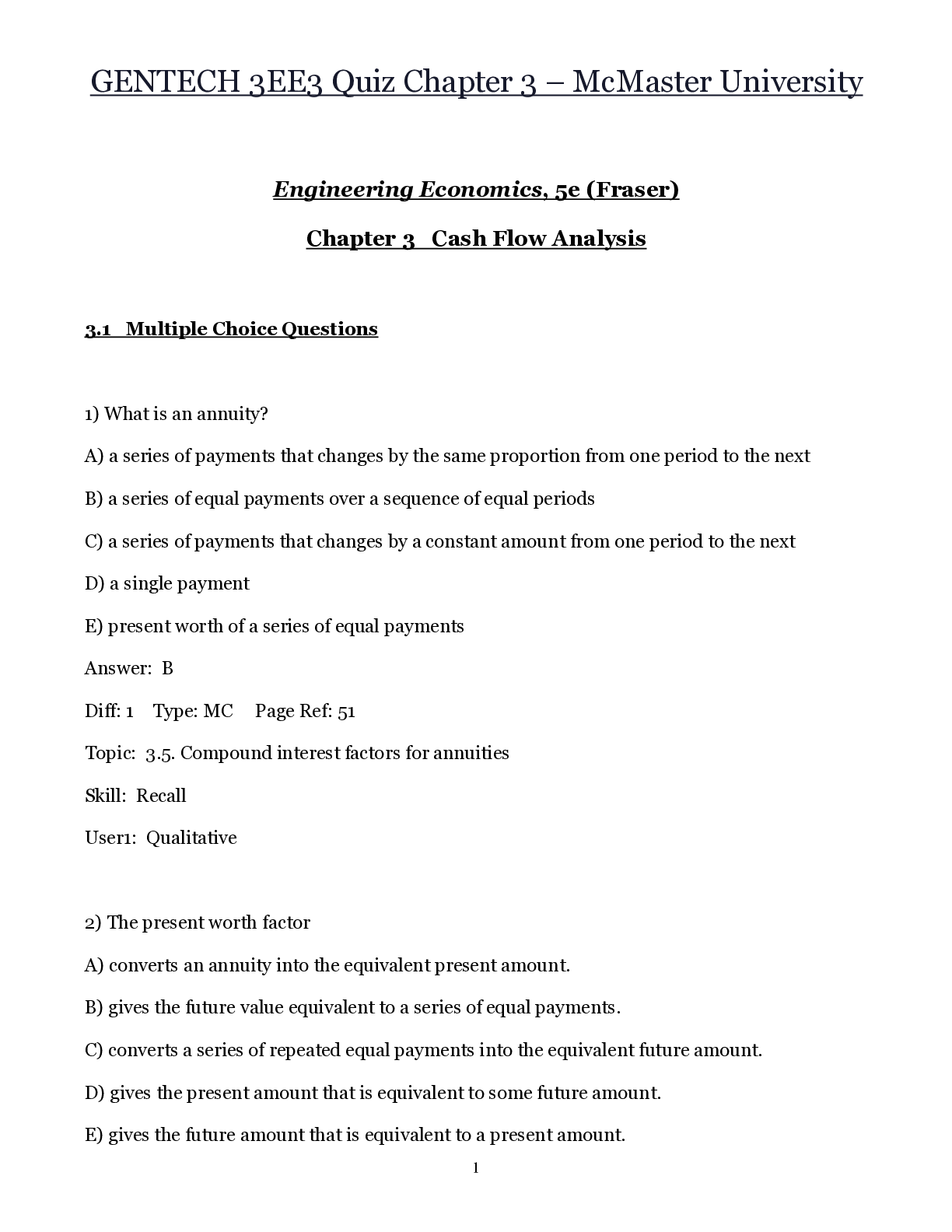
GENTECH 3EE3 Quiz Chapter 3 – McMaster University | Chapter 3 Cash Flow Analysis
GENTECH 3EE3 Quiz Chapter 3 – McMaster University Engineering Economics, 5e (Fraser) Chapter 3 Cash Flow Analysis 3.1 Multiple Choice Questions 1) What is an annuity? A) a series of pay...
By Martin Freeman , Uploaded: Nov 08, 2020
$14.5
Document information
Connected school, study & course
About the document
Uploaded On
Nov 08, 2020
Number of pages
23
Written in
Additional information
This document has been written for:
Uploaded
Nov 08, 2020
Downloads
0
Views
210






